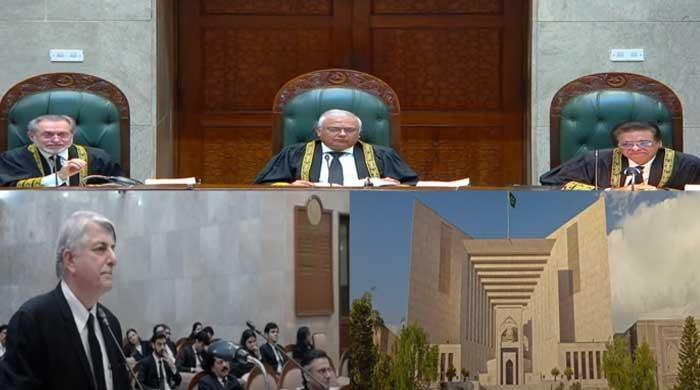- “The term “full court” is not mentioned in Section 191-A: Judge Mazhar.
- Adds that CJ has “no authority” in legal matters.
- Specific judges cannot be included in full court: Justice Mandokhail
ISLAMABAD: Supreme Court Justice Muhammad Ali Mazhar on Monday remarked that constitutional questions “will be heard only by the constitutional judiciary”.
Justice Mazhar made these remarks as the SC constitutional bench, headed by Justice Amin-ud-Din, heard several petitions filed against the 26th constitutional amendment passed by Parliament in October 2024.
Other members of the bench include Justice Jamal Khan Mandokhail, Justice Ayesha A Malik, Justice Syed Hasan Azhar Rizvi, Justice Musarrat Hilali, Justice Naeem Akhter Afghan and Justice Shahid Bilal Hassan.
“Like it or not, the term full court is not mentioned in Article 191-A. Constitutional cases will be heard only by the constitutional bench.”
Justice Mazhar added that the petitioners want the Chief Justice to refer the matter to a full bench, adding that “under Article 191-A, the Chief Justice no longer has such authority.” [to do so].”
Questioning the lawyer representing one of the petitioners, Justice Mazhar noted that some parties have suggested exclusion of judges from the full bench appointed after the 26th constitutional amendment.
“The judges you want to include in the plenary court are indeed judges but are not part of the constitutional judiciary,” he noted.
During the hearing, Justice Jamal Mandokhail observed that a full court cannot mean a bench comprising specific judges. “You can only ask for a full trial,” he told lawyer Abid Zuberi.
Justice Mandokhail said that if judges appointed before the 26th Amendment were to be included, some other judges should be left out.
Lawyer Zuberi clarified that he is not proposing the dismissal of any Supreme Court judge.
Justice Mandokhail then asked, “If the Judicial Commission declares that all judges of the Supreme Court are part of the constitutional judiciary, would you accept that? To which lawyer Zuberi replied: “Yes, absolutely, we would accept it. »
The proceedings of the case were broadcast live in accordance with the apex court’s earlier ruling. The court, after hearing the arguments, adjourned the hearing until tomorrow (Tuesday).
It may be noted here that several political parties, including Pakistan Tehreek-e-Insaf (PTI), Jamaat-e-Islami (JI), Sunni Ittehad Council (SIC), as well as various bar associations and former presidents of the Supreme Court Bar Association (SCBA), had challenged the amendment in October 2024.
Amendments to the constitution, which have since taken effect, require the legislature to choose the chief justice, set term limits for the top office and form constitutional benches.
Key Points of the 26th Amendment
- The tenure of the Chief Justice of Pakistan (CJP) is three years.
- Constitutional benches must be created in the SC and high courts.
- The most senior judge on each bench will serve as presiding judge.
- A parliamentary committee must appoint a new CJP from a panel made up of the three most senior judges.
- The committee will propose the name to the Prime Minister, who will then forward it to the President for final approval.
- JCP, headed by CJP and three others, responsible for appointing SC judges.
- The JCP will monitor the performance of judges and report any concerns to the Supreme Judicial Council.
- Complete eradication of Riba (interest) from the country by January 1, 2028.




